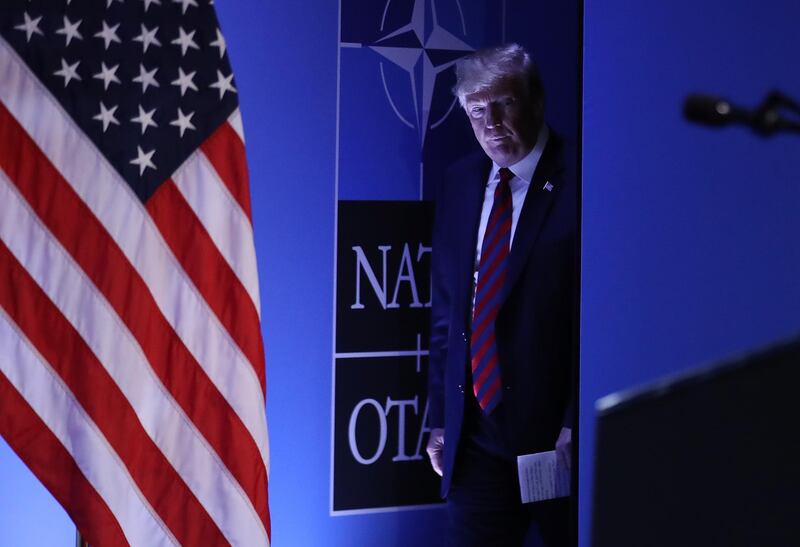After Donald Trump’s bizarre, vertigo-inducing performance at the recent Nato summit in Brussels, Washington's European allies frankly admit to being stunned and baffled.
They’re wondering if Mr Trump is really trying to achieve specific results, like increased military spending by other members, or is simply trying to destroy Nato and the Atlantic alliance.
Moreover, they’re wondering, if the latter is the case, whether Mr Trump is on his own idiosyncratic rampage, which they can wait out, or represents a new American consensus, meaning they must completely revamp their entire international strategy.
But if Europeans are unnerved by Mr Trump's performance, Americans who care about foreign policy are in a far worse predicament. Other countries can always change their policies. Americans are, for the meanwhile, stuck with this president.
Many are beginning to feel as if a drunken lunatic has seized the wheel of a bus and they are strapped into the passenger seats, not sure what wild and reckless maneuver to expect next and how they will survive the ordeal.
The American foreign policy conversation now centers around three fundamental questions.
First, does Mr Trump have any coherent foreign policy perspective or is this all simply instinctive, glandular posturing to appeal to his political base?
Second, is he deliberately trying to weaken the American international position or merely doing so inadvertently?
And, third, if this is indeed intentional, what explains it?
At the Nato meeting Mr Trump began by insulting the whole organisation, and particularly Germany. He issued the ridiculous demand that all member states quickly start spending 4 per cent of their GDP on defense, which he is well aware cannot and will not be done, including by the United States.
So, it certainly seemed that Mr Trump was deliberately trying to force the crack-up of the bedrock institution of American international power and prestige.
But then he flipped.
As the meeting closed, he claimed, apparently falsely, that all members had agreed to massive military spending increases. He expressed great affection for, and commitment to, Nato, and spoke of the "tremendous unity" of the organisation.
And, in fact, Nato took many crucial practical measures. There were important increases to defense spending, a vital plan for 30-day readiness, more troops in Iraq and Afghanistan, additional counterterrorism measures and moves to bring Macedonia into the alliance.
But no one could fail to recognise the vast damage Mr Trump's conduct did to Nato's unity, or shake the lingering sense that Mr Trump might be trying to prepare the American public for life without Nato, and without any permanent allies at all, for that matter.
An even bigger test of Mr Trump's intentions will come on Monday when he meets Russian President Vladimir Putin. For years, Mr Trump has expressed an unfathomable affection for the Russian autocrat, and he will have a stark, three-way, choice at the Helsinki meeting.
____________________________
Read more from Hussein Ibish:
'America first' is quickly turning into America alone
The White House iftar with no Muslim Americans encapsulates Trump's attitude to Islam
When being a 'yes man' isn't quite what it seems
____________________________
He can confront Mr Putin over Russia's outrageous international behavior and ongoing efforts to subvert American democracy.
Or he could tread water and have a pleasant and friendly meeting that commits to nothing and resolves nothing, and therefore, in effect, amounts to nothing.
Or, finally, he could provide the Russian leader significant unearned concessions that greatly strengthen the Russian hand at the expense of Washington and its allies.
Beyond election meddling, attempted and completed murders of Russians in Britain, the downing of civilian airliners, and much more, there are at least two crucial international issues on which Mr Trump might be preparing to give away the store to Mr Putin.
Mr Trump keeps implicitly endorsing the Russian invasion and annexation of parts of Ukraine, in particular Crimea. If he moves closer to recognising Russian authority in or sovereignty over Crimea, he will be giving Mr Putin a colossal gift, greatly damaging US and Western interests and prestige and committing violence against the UN charter and other basic instruments of modern international law and relations.
Also alarming is the potential for Mr Trump to hand Mr Putin an enormous win on Syria. A terrible idea, being promoted by Israel and Jordan, and by two of Mr Trump's own staffers – Brett McGurk and David Satterfield – would essentially recognise the legitimacy of the regime of Bashar Al Assad and effectively cede control of almost all of Syria to Iran and Russia.
The only condition would be keeping Iran and its proxy groups like Hezbollah away from areas adjacent to the Israeli and Jordanian borders.
The rest of the country would, in effect, be surrendered, including much of the sparsely populated but strategically vital areas currently under the control of US and US-backed forces, particularly near and along the Syrian-Iraqi border.
If Mr Trump agrees this disastrous idea, which serves the interests of Iran and Russia, and, in a very narrow sense, also Israel and Jordan, but definitely not those of the United States or, indeed, the Syrian people for that matter, Mr Putin will have every reason to celebrate.
The Nato meeting proved how reckless, disruptive and irresponsible Mr Trump can be. The Helsinki meeting will give a stronger indication of what his real intentions are, and how much he's willing to place his power and the office of the US presidency in the service of Washington's most dangerous adversaries.
If he does that, the only question left will be, why?
Hussein Ibish is a senior resident scholar at the Arab Gulf States Institute in Washington





